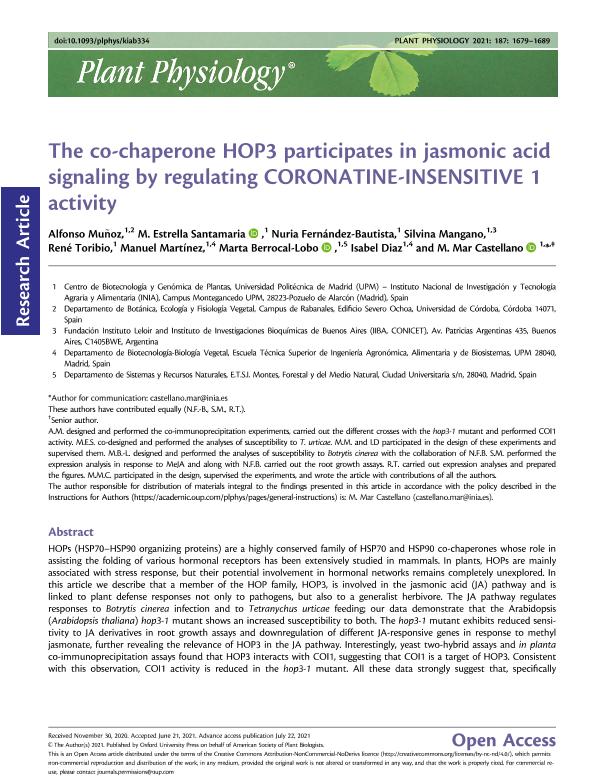Mostrar el registro sencillo del ítem
dc.contributor.author
Muñoz, Alfonso
dc.contributor.author
Estrella Santamaria, M.
dc.contributor.author
Fernández Bautista, Nuria
dc.contributor.author
Mangano, Silvina

dc.contributor.author
Toribio, René
dc.contributor.author
Martínez, Manuel
dc.contributor.author
Berrocal-Lobo, Marta
dc.contributor.author
Diaz, Isabel
dc.contributor.author
Mar Castellano, M.
dc.date.available
2023-09-22T16:07:40Z
dc.date.issued
2021-11
dc.identifier.citation
Muñoz, Alfonso; Estrella Santamaria, M.; Fernández Bautista, Nuria; Mangano, Silvina; Toribio, René; et al.; The co-chaperone HOP3 participates in jasmonic acid signaling by regulating CORONATINE-INSENSITIVE 1 activity; American Society of Plant Biologist; Plant Physiology; 187; 3; 11-2021; 1679-1689
dc.identifier.issn
0032-0889
dc.identifier.uri
http://hdl.handle.net/11336/212732
dc.description.abstract
HOPs (HSP70–HSP90 organizing proteins) are a highly conserved family of HSP70 and HSP90 co-chaperones whose role in assisting the folding of various hormonal receptors has been extensively studied in mammals. In plants, HOPs are mainly associated with stress response, but their potential involvement in hormonal networks remains completely unexplored. In this article we describe that a member of the HOP family, HOP3, is involved in the jasmonic acid (JA) pathway and is linked to plant defense responses not only to pathogens, but also to a generalist herbivore. The JA pathway regulates responses to Botrytis cinerea infection and to Tetranychus urticae feeding; our data demonstrate that the Arabidopsis (Arabidopsis thaliana) hop3-1 mutant shows an increased susceptibility to both. The hop3-1 mutant exhibits reduced sensitivity to JA derivatives in root growth assays and downregulation of different JA-responsive genes in response to methyl jasmonate, further revealing the relevance of HOP3 in the JA pathway. Interestingly, yeast two-hybrid assays and in planta co-immunoprecipitation assays found that HOP3 interacts with COI1, suggesting that COI1 is a target of HOP3. Consistent with this observation, COI1 activity is reduced in the hop3-1 mutant. All these data strongly suggest that, specifically among HOPs, HOP3 plays a relevant role in the JA pathway by regulating COI1 activity in response to JA and, consequently, participating in defense signaling to biotic stresses.
dc.format
application/pdf
dc.language.iso
eng
dc.publisher
American Society of Plant Biologist

dc.rights
info:eu-repo/semantics/openAccess
dc.rights.uri
https://creativecommons.org/licenses/by-nc-nd/2.5/ar/
dc.subject
Co-chaperone HOP3
dc.subject
Jasmonic acid
dc.subject
ORONATINE-INSENSITIVE 1
dc.subject.classification
Bioquímica y Biología Molecular

dc.subject.classification
Ciencias Biológicas

dc.subject.classification
CIENCIAS NATURALES Y EXACTAS

dc.title
The co-chaperone HOP3 participates in jasmonic acid signaling by regulating CORONATINE-INSENSITIVE 1 activity
dc.type
info:eu-repo/semantics/article
dc.type
info:ar-repo/semantics/artículo
dc.type
info:eu-repo/semantics/publishedVersion
dc.date.updated
2023-09-20T17:52:09Z
dc.journal.volume
187
dc.journal.number
3
dc.journal.pagination
1679-1689
dc.journal.pais
Estados Unidos

dc.journal.ciudad
Rockville
dc.description.fil
Fil: Muñoz, Alfonso. Universidad de Córdoba; España. Universidad Politécnica de Madrid; España
dc.description.fil
Fil: Estrella Santamaria, M.. Universidad Politécnica de Madrid; España
dc.description.fil
Fil: Fernández Bautista, Nuria. Universidad Politécnica de Madrid; España
dc.description.fil
Fil: Mangano, Silvina. Universidad Politécnica de Madrid; España. Consejo Nacional de Investigaciones Científicas y Técnicas. Oficina de Coordinación Administrativa Parque Centenario. Instituto de Investigaciones Bioquímicas de Buenos Aires. Fundación Instituto Leloir. Instituto de Investigaciones Bioquímicas de Buenos Aires; Argentina
dc.description.fil
Fil: Toribio, René. Universidad Politécnica de Madrid; España
dc.description.fil
Fil: Martínez, Manuel. Escuela Técnica Superior de Ingeniería Agronómica, Alimentaria y de Biosistemas; España. Universidad Politécnica de Madrid; España
dc.description.fil
Fil: Berrocal-Lobo, Marta. Universidad Politécnica de Madrid; España
dc.description.fil
Fil: Diaz, Isabel. Universidad Politécnica de Madrid; España. Escuela Técnica Superior de Ingeniería Agronómica, Alimentaria y de Biosistemas; España
dc.description.fil
Fil: Mar Castellano, M.. Universidad Politécnica de Madrid; España
dc.journal.title
Plant Physiology

dc.relation.alternativeid
info:eu-repo/semantics/altIdentifier/doi/http://dx.doi.org/10.1093/plphys/kiab334
dc.relation.alternativeid
info:eu-repo/semantics/altIdentifier/url/https://academic.oup.com/plphys/article/187/3/1679/6325517
Archivos asociados
